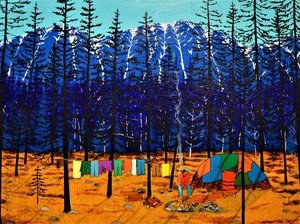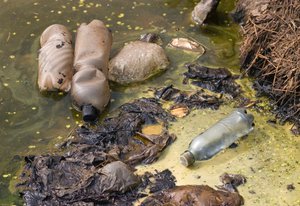CIGI and the Wiyasiwewin Mikiwahp Native Law Centre of the University of Saskatchewan College of Law recently released a collection of short essays titled UNDRIP Implementation: Braiding International, Domestic and Indigenous Laws, which discusses how international law, domestic constitutional law and Indigenous law can support full implementation of the United Nations Declaration on the Rights of Indigenous Peoples in Canada. In this video, the collection’s contributors provide an overview of how the relationship between Indigenous peoples and the Canadian government has changed since first contact. The effort to bring harmony to these diverse strands of law — international, domestic and Indigenous — amid reconciliation comes with both risk and opportunity.
How UNDRIP Changes Canada’s Relationship with Indigenous Peoples
How UNDRIP Changes Canada’s Relationship with Indigenous Peoples
[JAMES SA’KE’J YOUNGBLOOD HENDERSON]
What we encountered in the constitutional battles in Canada is that when we wanted to apply human rights to Indigenous people, the government said, “You don’t have human rights because you’re the wrong kind of people.” And that stood as a shock, but it’s part of the discrimination that we’ve had to endure. So we had to go to the [United Nations] General Assembly, and what we had to do was get a declaration that basically said that Indigenous people have the same human rights as any other people.
[JOHN BORROWS]
Canada’s current legal landscape in relationship to Indigenous peoples is complex. There’s one story that is about the denial of Indigenous place and governance in this land. When Indigenous peoples first encountered Europeans there was a nation-to-nation relationship, a meeting of equals where there was mutual respect and the pursuit of common goals. As we went through the nineteenth century, we found that those goals were eroded and the nature of the relationship was one of sovereign-to-subject.
[JOSHUA NICHOLS]
And that places Aboriginal peoples in Canada in a subject-to-sovereign relationship much in the same that citizens, under the Charter, in relationship to the federal government as their sovereign. Yet the theory explaining how this works in both these cases becomes quite different, because the history of Indigenous peoples is not collapsible to the history of citizenship in Canada.
[LARRY CHARTRAND]
Canada has never yet recognized an Aboriginal right to self-government, unlike, for example, in the United States. And the reason is because the court has interpreted Aboriginal rights so narrowly — has to be a custom, tradition or practice — and that an argument that you have an Aboriginal right to self-government is seen as too broad in scope for the court to be prepared to recognize because they’ve defined the rights so narrowly.
[JOHN BORROWS]
UNDRIP changes Canada’s relationship with Indigenous peoples in terms of the duty to consult by saying that the honour of the Crown, which is part of the legal duty to consult, must involve the free, prior and informed consent of Indigenous peoples. What that means is that when the Crown is exercising its powers to develop, that it has to ensure that honour involves the free will, or the participatory actions of Indigenous peoples in that goal.
[AIMEE CRAFT]
So UNDRIP is a mechanism for recognizing self-determination of Indigenous people. This has been a long-fought effort to have states acknowledge that Indigenous peoples have governance, have laws, have relationships with their lands and territories, and have never given up those laws or governance systems or special relationships with lands, territories and waters.
[SARAH MORALES]
And I think that’s really what the Declaration is seeking to do. It’s just creating space for Indigenous people to be able to live according to their own legal traditions and make decisions about their lives in a way that best reflects their individual needs.
[KERRY WILKINS]
The harder part is what the federal government, in particular, should continue to do or should not continue to do, in light of the fact that the United Nations Declaration guarantees a right of self-determination entitling Indigenous communities, properly organized, to govern themselves in whatever fashion suits them best.
[JOSHUA NICHOLS]
But it is to their advantage, in my mind, to look to the UN Declaration as a means of placing renewed emphasis on that very old struggle and to try to, in a certain sense, leverage the arguments that are built within that document as a set of norms that move away from the colonial heritage of the Canadian constitutional order and how it’s built in and give us means to critique and point to the problems in our constitutional order that have become hidden in plain sight.
[JAMES SA’KE’J YOUNGBLOOD HENDERSON]
And that’s what’s important about the Declaration. It lays out for states and state governments and other humans: this is what Indigenous people want to be respected for.
For media inquiries, usage rights or other questions please contact CIGI.
The opinions expressed in this article/multimedia are those of the author(s) and do not necessarily reflect the views of CIGI or its Board of Directors.


